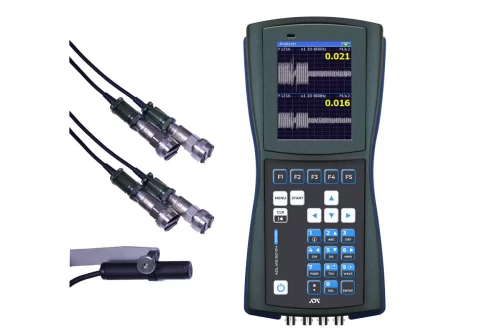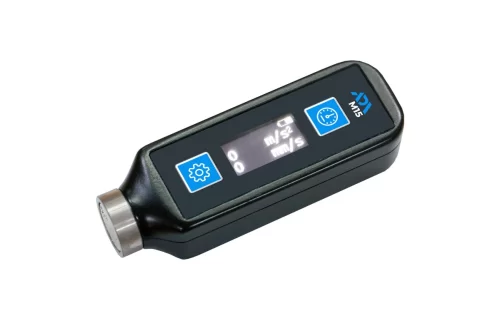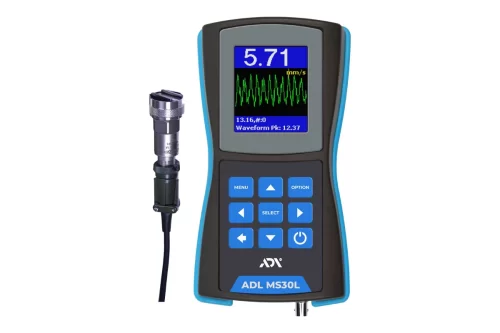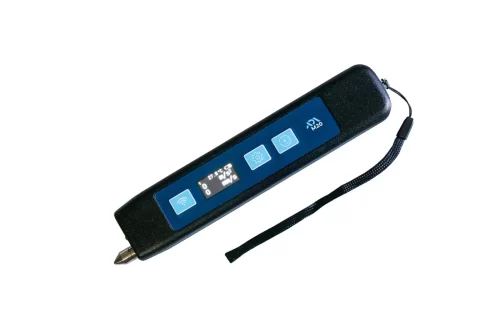Description
ADL MS52 in Uzbekistan, Tashkent
Using the device
The vibration analyzer is designed to measure general vibration parameters, analyze the vibration spectrum of rotating equipment, quickly evaluate it according to ISO 10816, monitor the measurement status and collect data for subsequent diagnostics and adjustment of various industrial equipment.
Device features and functions:
- 2 channels for measuring and assessing the vibration spectrum
- Classic reliable piezo accelerometers
- Wide frequency range for high-quality and professional diagnostics Wide range of functions, including horizontal and vertical machine alignment, gasket simulator and thermal expansion calculation.
- Preparation of reports in PDF and other formats
- Large capacity flash drive for storing measurements and reports.
- USB interface for connecting to a PC
- Energy-dense battery
- Metrics, archiving and reporting software
- Intuitive interface
- Bright and colorful display.
Main area of application of the devices
This is operational monitoring of the mechanical condition during operation, diagnostics, maintenance and repair of equipment: bearings, gears, turbines, generators, fans, pumps, rotors, distribution plants, ball mills, rolling mills, gearboxes, conveyors, engines, blowers and many others types of equipment. The MS series vibration analyzers are suitable for monitoring both entire structures and individual elements.
MS series vibration analyzers are used in metallurgy, mechanical engineering, petrochemical, light and defense industries, thermal and nuclear energy, agricultural machinery maintenance, housing and communal services, and transport.
The presence of a service center based at Adelix in Ankara, Turkey, provides warranty and post-warranty service for the entire period of operation.
Delivery content
- Measuring unit;
- Accelerometer, cable 1.5 m, magnet for fixation – 2 or 4 pcs. ADL MS52;
- Optical sensor, magnetic stand;
- USB charger;
- USB cable;
- Flash drive with software and user instructions ADL MS52;
- Bag for transportation and storage
- Additionally for the laser aligned version:
- Sensors S, M wired or wireless;
- Universal V-shaped brackets with chains;
- 100 mm, 150 mm;
- Roulette 3 min.
- Vibration Measurement and Analysis: A vibration analyzer is typically used to measure, analyze, and monitor vibrations in machinery, structures, and components. It can detect vibrations in terms of frequency, amplitude, and other parameters to evaluate the condition and health of equipment.
- Measurement Methods: Vibration analyzers use various measurement techniques such as FFT (Fast Fourier Transform) analysis, time-domain analysis, and frequency-domain analysis to capture and analyze vibrations. These methods enable the identification of vibration sources, frequencies, and patterns.
- Measurement Range: A vibration analyzer would come with a specified measurement range, indicating the frequencies and amplitudes it can accurately measure.
- Accuracy and Precision: The specifications would detail the device’s accuracy and precision in measuring vibrations, typically expressed in terms of frequency resolution, amplitude sensitivity, and dynamic range.
- Display and Controls: A vibration analyzer would feature a display screen to present measurement readings, spectra, and settings, accompanied by controls and buttons for operation and configuration.
- Applications: Vibration analyzers find applications across industries such as manufacturing, aerospace, automotive, energy, and transportation. They are used to monitor machinery health, detect faults, and prevent unexpected failures, thus playing a crucial role in predictive maintenance programs.
- Portability: Depending on its design, a vibration analyzer may be portable, allowing for on-site measurements and field applications.
- Data Logging and Reporting: The vibration analyzer may have built-in memory for storing measurement data, facilitating later analysis and report generation. It might also be compatible with software for more in-depth data analysis and reporting.
- Battery Power: It’s likely that the vibration analyzer operates on battery power, providing flexibility for usage in various locations without the need for a power outlet ADL MS52.
- Calibration: Regular calibration is essential to ensure the accuracy of the measurements. The vibration analyzer would likely come with calibration instructions or require calibration by a certified technician.
- Accessories: The vibration analyzer might be bundled with accessories like accelerometers, mounting fixtures, cables, and software to enhance its functionality and usability.
If the ADL MS52 is a specific model, you might want to consult the manufacturer’s documentation or contact the manufacturer directly for detailed specifications and information.
Other products in category Vibration Diagnostics






